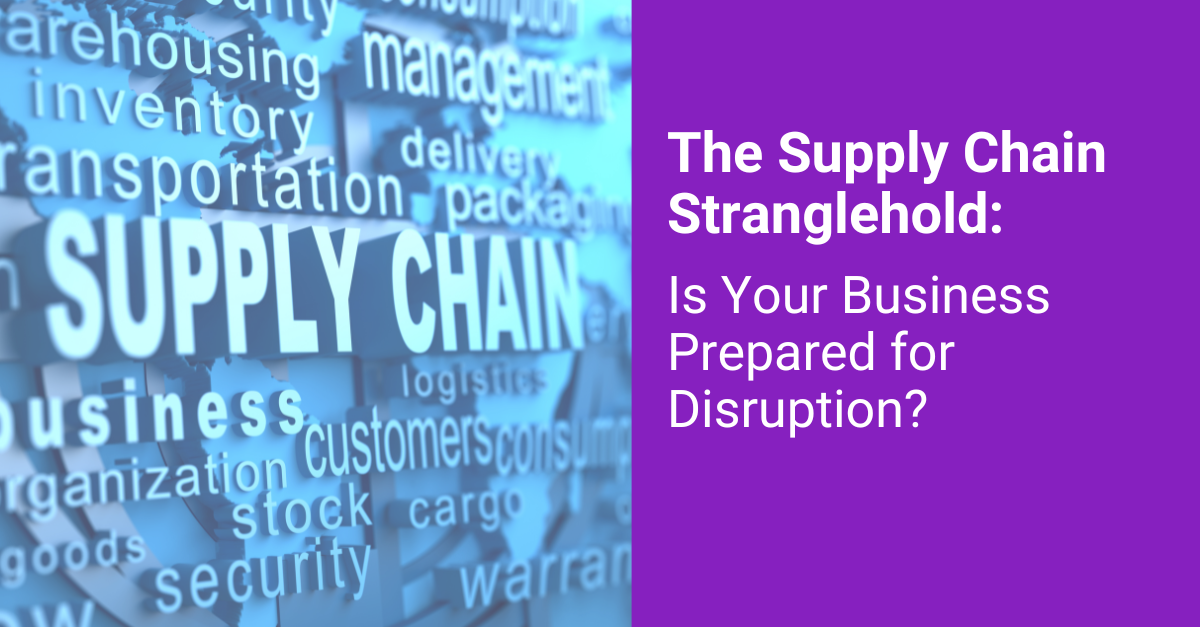The Supply Chain Stranglehold: Is Your Business Prepared for Disruption?
- Santosh Kore

Ever feel like you’re one headline away from disaster? One minute you are cruising along, meeting customer demand and keeping your business humming. The next, a news report flashes on your screen – a natural disaster, a political conflict, a global pandemic. Suddenly, your carefully crafted supply chain feels like a house of cards, ready to topple in the slightest breeze.
Sound familiar? In today’s interconnected world, supply chain disruptions are no longer a rare occurrence, they’re the norm. A staggering 11,642 disruptions were reported globally in 2021 alone. Source:Statista, wreaking havoc on businesses of all sizes. And the cost? A hefty one, with 84.6% of businesses experiencing increased costs due to disruptions. Source:BCI Org
What Supply Chain Disruption is!
Supply chain disruption refers to any significant interruption or disturbance in the flow of goods, materials, or services within a supply chain network. This interruption can arise from a range of factors, including but not limited to:
- Pandemics and Health Crises: Outbreaks of diseases, such as the COVID-19 pandemic, can lead to a rise in shipment cost, workforce shortages, factory closures, restrictions on movement, and disruptions in global trade and logistics.
- Natural Calamity: When natural disasters strike, they can have far-reaching effects on economies and supply chains. Whether it is a hurricane, tsunami, snowstorm, wildfire, or earthquake, these events inevitably disrupt global supply chains in several ways by creating an imbalance in supply and demand.
- Geopolitical Tension: Political instability, regional conflicts, and terrorism have far-reaching consequences such as uncertain operating environments due to sudden sanctions and changes in tariff, increased delivery cost, and extended delivery time.
- Technological Challenges: Unexpected software glitches, IT system failure, problems in robotic automation, and threats impacting data security & integrity.
How Supply Chain Disruptions are affecting businesses
The consequences of supply chain disruptions are far-reaching. Here’s how businesses are feeling the pinch:
- Inventory Shortages: Disruptions can lead to stockouts, forcing businesses to raise prices or lose sales altogether.
- Increased Costs: Businesses struggle with rising transportation costs, fuel prices, and raw material shortages, impacting their bottom line.
- Production Delays: Delays in receiving parts or materials can stall production lines, leading to missed deadlines and frustrated customers.
- Operational In-efficiencies: Disruptions expose weaknesses in existing supply chains, highlighting the need for greater visibility and agility.
Supply Chains are arguably one of the most affected business areas by disruptions, significantly influencing business strategy. In normal circumstances, supply chain managers would majorly focus on supply chain efficiency by keeping low inventory carrying costs by operating as per just-in-time principles.
However, in case of disruptions, handling volatility demands a paradigm shift in approach. The new approach needs to pivot to risk mitigation and demands sourcing and logistics to do more with less. Therefore, crafting strategic tactics in response to disruption requires organisational effort, relying on informed decisions based on factual inputs from departments and various stakeholders within the organisation.
Connected Supply Chain
This is where InspireXT’s Connected Supply Chain Management, supported by Oracle’s Fusion Cloud Supply Chain Management, plays a crucial role. How? Let us delve into it further.
Order Management, Procurement, and Inventory Cost Management solutions optimise the whole supply chain process and streamline the flow of goods with improved efficiency. InspireXT’s team of experts collaborates with businesses to blueprint a roadmap to bring optimization from your cloud applications.
Example: In the recent Covid-19 pandemic, there was a surge in demand for ventilators. The OEMs were overwhelmed with high demand, as not only did they have to ramp up manufacturing capacity but also procure additional components from suppliers. One such OEM using Oracle Fusion Cloud managed the risk by,
- Diversified sourcing – Buyer leverages a unified solution of item replacement and seeks alternate suppliers for the same item. With a predefined template, he created a new agreement with the supplier and released the PO in a short time.
- Proactive Inventory Planning – The combination of cycle count and Inventory planning (Min-Max, ROP) helped to maintain a healthy inventory.
- Diversified shipping routes – OTM allowed companies to minimize cost, and optimize service levels, by creating flexible business process automation within their global transportation and logistics networks.
- Orders in Jeopardy: This feature alerts users when a specific orchestration task is delayed. It provides the order management clerk essential time to take corrective action before the matter goes out of control.
Demand forecasting, Dynamic inventory allocation/prioritisation, alternate sourcing, and item substitutes are some of the key features that help in times of disruption. Additionally, InspireXT’s key accelerators provide high-end data analysis, planning recommendation integration framework, and templates for faster data loads.
Example: Generally, manufacturers schedule productions months in advance. But in the event of disruptions planners quickly collect data real-time data and analyse it to adjust plans more frequently allowing planners to take on spot decisions. Also, can simulate ‘what-if’ demand scenarios to assess the impact of disruptions (sudden increase/decrease of demand)
InspireXT’s methodology centers on process optimisation, strategic business design, and the meticulous construction of information systems tailored for Industry 4.0 integration. This will help you to navigate through new system adoption amidst fast-changing demand.
Example: Once the application is configured properly then Oracle cloud can dynamically allocate finished goods to high-priority orders ensuring critical demand is met in case of supply shortages or disruptions.
Oracle Cloud PLM provides a digital thread that standardizes the design, planning, manufacturing, and service processes to help drive faster, higher-quality innovations. PIM/Item master acts as a common data model for quick and accurate data decisions.
Thus, managing supply chain disruptions demands a multifaceted approach, forward-thinking, continuous transaction monitoring, data & analytics, real-time visibility, data-driven decision-making, what-if simulations, diversifying supply routes, and having a planning system agile and fit for purpose. A recent Gartner survey also underscores the importance of proactive risk management, timely technology adoption, and collaboration in building resilient supply chains capable of navigating disruptions and maintaining business continuity.
Conclusion
The global business landscape is fraught with uncertainty. Supply chain disruptions are no longer a question of if, but when. The good news is that you don’t have to weather these storms alone. By implementing a proactive approach that prioritises risk mitigation, real-time visibility, and data-driven decision-making, you can build a resilient supply chain capable of adapting to disruptions and ensuring business continuity.
InspireXT, in partnership with Oracle with expertise in Oracle Fusion Cloud Supply Chain Management solutions, offers a comprehensive suite of tools and expertise to help you navigate the ever-changing world of supply chain management. From demand forecasting and inventory optimisation to strategic sourcing and real-time data analysis, InspireXT can empower your team to not only survive disruptions but thrive in the face of adversity.
Request for services
Find out more about how we can help your organisation navigate its next. Let us know your areas of interest so that we can serve you better.




